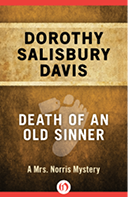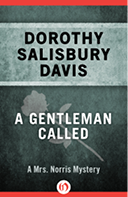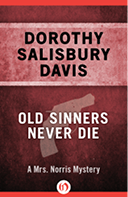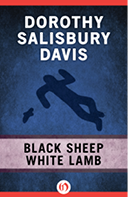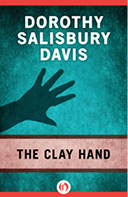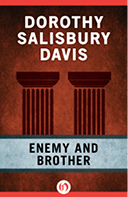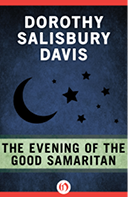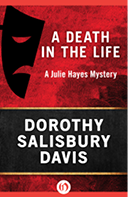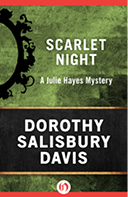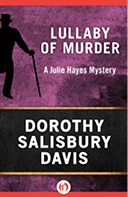Town of Masks (27 page)
Authors: Dorothy Salisbury Davis

Copithorne wiped the sweat from his face. “Governor Michaels, friends, and neighbors,” he started again, holding a limp piece of paper in a trembling hand. “It is my honor to conclude the day’s celebration with the presentation of an award—”
Not your honor, you fool,
Hannah thought.
Yours is to introduce Franklin Wilks. Quickly that we may be done quickly. You can’t make an award to your own daughter!
Hannah looked at Wilks. It had all been arranged. He carried the prize-winning poem in his pocket. Still he stood, rocking back on his heels, a grim smile on his mouth. He knew Copithorne’s inadequacy to a public appearance. Still he made no move to help him, to save him.
“This is to be an annual award for an annual poetry contest—” His voice quivered as much as his hand. “It will be sponsored by the Campbell’s Cove Library—” His voice seemed to fail entirely. Hannah saw Wilks raise his fist as though to stick courage into him. Her own heart was throbbing fearfully. Copithorne thrust his head upward. “It will be called the Nathan Blake Memorial. And this year’s winner is Kenneth Tobin. Congratulations, Kenneth!”
The last cheer of the day went up for Kenneth Tobin.
H
ANNAH ROCKED BACK AND
forth on the chair, trying to find a position at which it might be steady. The whole sea of faces bobbed together before her and seemed to congeal in a mass of flesh. She drew one deep breath after another. The platform was empty, except for her. Below her the Shanes, the Bakers, and a few others were clamoring up their congratulations.
Hypocrites, she thought—no, they didn’t know. The conspiracy was not theirs, not yet. Copithorne, Wilks, and Elizabeth. Sykes, too, of course. But Elizabeth’s revenge on her, the full, fearful revenge, even to the witness of Nathan Blake.
She got up, helped by the hands extended
to
her, making no response to the congratulations, the commiserations on her weariness and her right to be weary. Passing among them, she tried to gain some composure, a moment’s estimate of what the disclosure meant. She could not measure it, not now. She stopped. She had done right! Doing it, she was sure she had one right, saving the town from Sykes’s scorn, his cynical abandon of it, his prank—
But where, then, were the friends to congratulate her on that? The friends who knew and would congratulate her for it? Copithorne and Wilks conspired with Elizabeth. Not they! They preferred his prank to hers. She searched for O’Gorman. Gone. And what did he know of poetry? She moved in frantic pursuit of the retreating crowd. Sophie, if she could find her, she thought. Sophie would take her home and comfort her.
“Miss Blake!”
She turned to see Tobin and his son. Tobin caught her hand and pumped it violently. “That award’s going to start Kenneth in college.”
“If the army doesn’t get me,” the boy said. “But I’m real grateful, Miss Blake.”
His young, freckled face was so earnest, so sincere she could have struck her fist at it. A town half-friend, half-foe—with smiles on foes and scowls on friends, a town of masks.
She caught at Tobin’s sleeve. “Will you take me home? I don’t feel well.”
“I’ll take you home, Miss Blake.”
Matheson put his hand beneath her elbow and guided her forward. At his car Elizabeth and Dennis were waiting. Hannah tried to focus her attention. Her mind was brittle, crumbling, the sounds in it like the sounds in Maria’s house.
Elizabeth looked away as she drew near, as though the very sight of her was more than the girl could stand.
“So, Dennis,” Hannah said, casually, she thought, “you’ve come back.”
“Chief Matheson brought me, Miss Blake. But I’m going to stay now.”
“That’s nice,” she said. “I hope you’ll be very happy here. Now, Matt, I should like to go home. It’s been a trying day. It must have been a difficult one for you, too. I understand you have resigned.”
“I don’t like to be told not to bring a man in,” Matheson said, “even if it’s to prove he’s the wrong one. At least, I did that.”
“I’m going to recommend to the council that you get your pension,” she said.
There was an involuntary exchange of glances between Elizabeth and the policeman. It was more than she could endure.
She thrust her head up. “Am I to be kept standing here like a store dummy?” she demanded. “I am Nathan Blake’s daughter, you know.” She turned on Elizabeth. “Didn’t you have revenge enough with the poetry prize? Now you’ve got your little Sykes. Soon you’ll have the whole town laughing—”
“Miss Blake,” Elizabeth interrupted. “Was it you who turned the flashlight on Dennis and me on the beach that night?”
“Yes, it was I!”
Elizabeth turned to Matheson. “There you have the beginning, and the proof that Dennis and I were together that night.”
“The beginning of what, my dear?” Hannah said.
Elizabeth answered, but spoke only to Matheson. “The beginning of her hatred for Dennis, the phone calls on the night Tom was married, the whole foul business. A kiss—God knows what it is to her. Fornication, maybe. I don’t know the words for it. And the end of it here—her changing the winner of the contest.” Finally, crying, the girl turned to Dennis. “Let’s go away from here quick. It’s like a disease and the air is full of contagion.”
“May I go, sir?”
“Go, and bless you,” Matheson said. “The sheriff doesn’t want you. I think he’s got it all set—who he wants … when he wants them.”
“But that wasn’t the end of it, Elizabeth,” Hannah called out. “I killed Maria that night.”
There was nothing but silence then, an incredulous, pitying silence. The parking lot was empty, and all that lay between them and the red sumac trees was a film of sun-tinted dust, glinted with cellophane and tinfoil debris.
“I’ll take you home now, Miss Blake,” Matheson said finally.
She got into the car as he held the door, and while he went around to the driver’s seat, she stared at the retreating shapes of Elizabeth and Dennis.
They don’t believe it,
she thought.
They think I was making one last bid for their attention. And really, I might have been,
she realized.
“Matt,” she said, when he was beside her, “I found Maria’s jewels, just last night. I broke into her house—I—” She realized then how small was the evidence of her presence there, one broken pane of glass. “I threw them into the bottom of the Cove this morning,” she ended flatly.
“Did you?” the policeman said, as though she had told him she had caught a cold.
He turned the car toward her house. “Aren’t you going to take me to the sheriff’s office?”
“No, Miss Blake. You tell him all about it. I’m not a policeman any more. I’m just doing you a kindness, taking you home.”
“That was never a kindness,” she murmured.
F
ROM THE MOMENT SHE
entered her own door, she felt the presence of a doom that seemed as familiar as the house. It was a sense of death and after-death much as she had known it the day of Maria’s funeral. She sat down at her desk and wrote a description of the coffin as she remembered it. Then she wrote instructions for its purchase. She thought for a few moments, writing finally:
Some day if you drag the Cove in the area of where the lead boat was when the planes went overhead today, you will find the jewels weighted in the bottom of a first-aid kit.
Hannah Blake did kill Maria Verlaine. Her punishment is not the hanging, as you will find her, but that even that she had to do for herself.
Dorothy Salisbury Davis is a Grand Master of the Mystery Writers of America, and a recipient of lifetime achievement awards from Bouchercon and Malice Domestic. The author of seventeen crime novels, including the Mrs. Norris Series and the Julie Hayes Series; three historical novels; and numerous short stories; she has served as president of the Mystery Writers of America and is a founder of Sisters in Crime.
Born in Chicago in 1916, she grew up on farms in Wisconsin and Illinois and graduated from college into the Great Depression. She found employment as a magic-show promoter, which took her to small towns all over the country, and subsequently worked on the WPA Writers Project in advertising and industrial relations. During World War II, she directed the benefits program of a major meatpacking company for its more than eighty thousand employees in military service. She was married for forty-seven years to the late Harry Davis, an actor, with whom she traveled abroad extensively. She currently lives in Palisades, New York.
All rights reserved, including without limitation the right to reproduce this ebook or any portion thereof in any form or by any means, whether electronic or mechanical, now known or hereinafter invented, without the express written permission of the publisher.
This is a work of fiction. Names, characters, places, events, and incidents either are the product of the author’s imagination or are used fictitiously. Any resemblance to actual persons, living or dead, businesses, companies, events, or locales is entirely coincidental.
Copyright © 1952 by Dorothy Salisbury Davis
Cover design by Tracey Dunham
978-1-4804-6049-2
This edition published in 2014 by Open Road Integrated Media, Inc.
345 Hudson Street
New York, NY 10014

